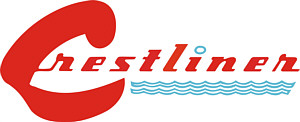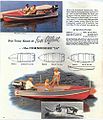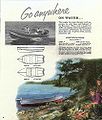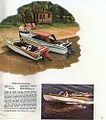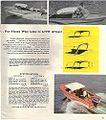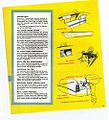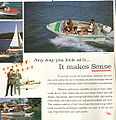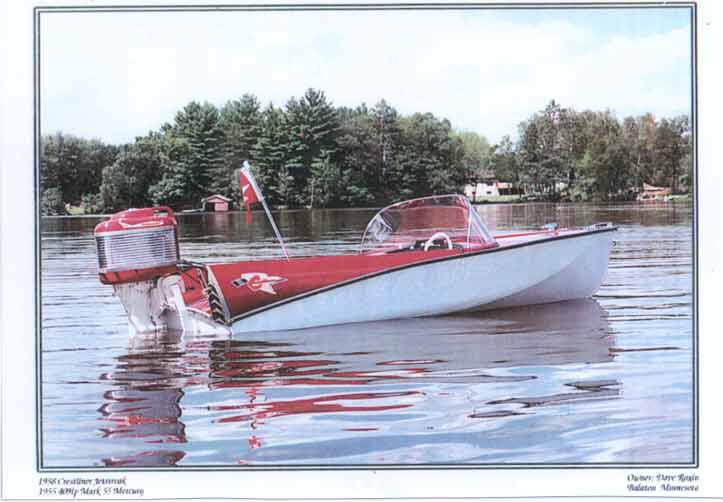Crestliner
The following excerpt is taken from The Enfield Historical Society, Inc. Newsletter Dated June 2009
Thompsonville’s Boat Building Giant
For three short years starting in 1960 Thompsonville was home to a major boat manufacturing company. In April of that year the Bigelow Sanford Carpet Co., Inc. acquired an option to buy majority stock interest in Crestliner Inc., which was one of the five largest U.S. manufacturers and distributors of outboard boats at the time. The Bigelow board of directors acted quickly and the $2,250,000 sale was completed on April 28. $600,000 was paid up front in cash, with the remainder to be paid in three annual payments. Crestliner was founded in 1946 and by the time of the sale employed 600 workers at its plants in Strasburg, Virginia, Little Falls, Minnesota, Morrilton, Arkansas, and Waterloo, Ontario, Canada. Approximately 40 models of fiberglass and aluminum boats ranging in size from 12 to 19 feet and selling for prices between $215 and $2,300 were built at the plants. Crestliner had about 1,400 dealers nationwide and annual sales of about $5,000,000.
Why did Bigelow Sanford purchase Crestliner? According to company president Lowell Weicker (father of the future Governor) it was part of a plan to diversify Bigelow’s product line, a sound strategy to increase profits and protect against future drops in carpet sales. Just a few days later, in fact, stockholders voted to change the company name to Bigelow-Sanford Inc. to reflect the company's diversified interests.
Although early reports on the purchase stated that Crestliner would be operated as a wholly owned subsidiary with no changes to management, plans were already in place by the end of June, 1960 to move Crestliner’s headquarters to Thompsonville. Bigelow Sanford officials were being placed on both Crestliner’s board of directors and in management positions. Lowell Weicker was named chairman of Crestliner’s board of directors and Bigelow’s executive vice president William N. Freyer and comptroller Robert L. MacKenzie were also chosen to be on the board. Bigelow’s vice president of finance, John A Donaldson, was to hold the same position at Crestliner. The next three years would see many management changes for Crestliner, some happening only weeks or days apart. A major marketing and publicity event was held on September 8, 1960 when the first of two annual regattas was held on the Connecticut River next to the Bigelow-Sanford factory. The new 1961 Crestliner models were on the river for dealers, dignitaries, and reporters to see and ride in. A special red-carpeted dock had been built for the event and twenty boats were trucked in from the Virginia plant (manufacturing had not yet started in Thompsonville). Many state and local officials attended, including Governor Ribicoff. More importantly, 200 dealers from New England and surrounding states came to see the products. The day started at 9:00 A.M. with a dealer seminar at the Strand Theater. A luncheon was held at 12:30 P.M. and a barbecue near the dock at 5:15 P.M. The day was beautiful and apparently a great success. Company officials optimistically predicted that 150 people would be employed in manufacturing boats in Thompsonville by February of 1961, with a production goal of 2,000 boats for the first year. A showroom was planned for Thompsonville to allow dealers in the region to view the Crestliner line at their convenience. A second regatta was held on September 7, 1961 to entice more dealers to carry the full Crestliner line. Despite the public optimism, things were not working out as planned. Some employees were hired and limited manufacturing was started, but employment numbers never approached predictions, peaking at about 60, and layoffs were common. Some of Crestliner’s new Royalite canoes were finished in Thompsonville, although the hulls were made elsewhere. The March 1, 1962 edition of the Hartford Courant showed a picture of a Thompsonville-made Viking 20 fiberglass boat with a 100 horsepower inboard-outboard engine cruising past the Charles W. Morgan at Mystic Seaport. Yet, just a few days later all production workers were laid off and manufacturing moved to the Virginia plant. Other operations were gradually phased out during 1963.
On March 1, 1964, Crestliner was sold to Molded Fiber Glass Body Co. of Ashtabula, Ohio for about $2,000,000. What went wrong? Bigelow bought Crestliner just as an unexpected general slump in boat sales began. Ironically, even with lower than expected boat sales Bigelow-Sanford’s overall profits went up after the purchase because of increasing demand for commercial carpeting and Bigelow’s transfer of carpet manufacturing to lower-cost southern plants.
For readers who crave irony, Enfield’s Board of Selectmen adopted a new town seal on January 28, 1963 that featured two boat propellers representing the local Crestliner boat plant, even as that plant was being shut down. That seal, which is still our town seal today, also has a weaver's knot representing the carpet industry and powder kegs and cannon balls representing The Hazard Powder Company.
1958 Catalog/Brochure:
1959 Catalog/Brochure:
1960 Catalog/Brochure:
1961 Catalog/Brochure:
1963 Information:
1964 Information:
External Links:
http://www.retrocrestliner.com
{{#ev:youtube|QKD--noRx0k}}
